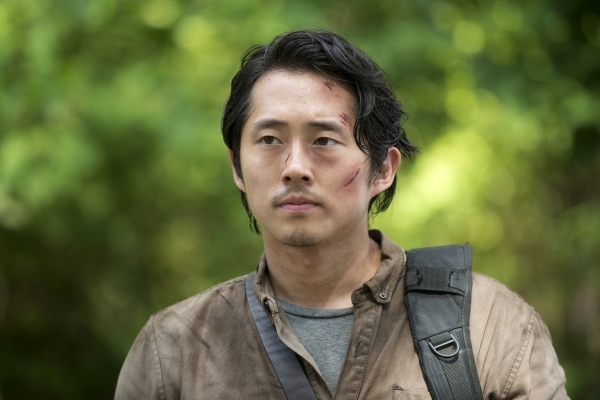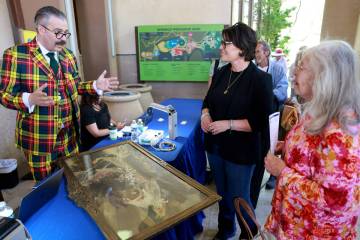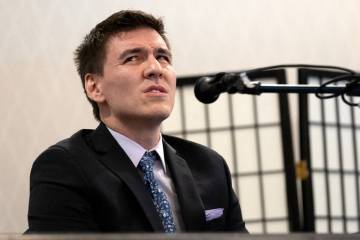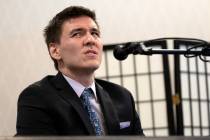Why do we grieve so deeply for fictional characters?
Glenn is dead! Or maybe he isn't!
Either way, the potential death-by-zombie of the good-hearted hero and father-to-be in the AMC series "The Walking Dead" is freaking out fans who don't know whether to mourn his death or continue to hope that his apparent death was, somehow, just a horrible mistake.
That fans are able to so sincerely grieve the possible death of Glenn is a testament to the talents of the show's writers and actor Steven Yeun, who portrays him. But, says novelist Deborah Coonts, that fans can grieve a person who's, well, not actually a real person also "really goes to why you do create characters in the first place."
Coonts is author of a series of Las Vegas-based mysteries featuring Lucky O'Toole, executive of a fictional Strip hotel. In creating any character, Coonts says, "you try to establish an emotional resonance with your reader.
"To do that, you have to share sort of a common experience or play to a common emotion. The better you are at that, the more people start to identify with the character. They see themes in the character, so they get really invested in the journey, because the character can take a journey you and I may not take, especially in 'The Walking Dead' or Lucky. We're not going to do things those characters are doing."
Glenn began his zombie apocalypse journey as a pizza delivery boy who saved lead character Rick from a zombie attack. In the seasons since, Glenn has grown into a hero and a leader himself. Coonts suspects Glenn's everyman evolution may have something to do with how badly fans are taking his possible death.
"Everybody can see themselves in that person," she explains. "We've all been the pizza delivery boy, or the equivalent, at some time in our life, and isn't it great that this humble person in the story that we can identify with went on to become a big hero? That's empowering to us."
Over the seasons, "you've sort of invested a lot of yourself in the character, and then (he) died," Coonts says. "It's like losing a part of yourself.
David Copeland, an associate professor of psychology at the University of Nevada, Las Vegas, says that when we become immersed in movies and TV shows and books, "it's kind of like we transport ourselves into that fictional world."
Of course, we know it's a fictional world and that the people we find in it aren't real. Still, that fictional world can, at least to some degree, become as vivid and as real to us as the world in which we actually live, and to enjoy that world, we're willing to temporarily put aside our knowledge that the world isn't real.
"Even if it's completely fictional — say, zombies or aliens or whatever — we're willing to suspend that disbelief while we're in the mode of being transported into that world," Copeland says.
Copeland says it's characters that we like or respect or feel a kinship with that are the toughest for us to lose and that the intensive knowledge we gain about them over time can heighten the sense of emotional loss we feel when they're no longer around.
"One interesting thing about stories, whether books or films or TV shows, is, we become intensely familiar with these individuals," Copeland says. "We get to know them really well because the camera, the story follows them around or gets into very personal aspects of their lives."
Granted, the grief we feel for the loss of fictional characters isn't as intense as the grief we'd feel for the loss of real people in our lives, "but it still affects us to some degree,' Copeland says.
Authors know how powerful it can be to kill off a character, but it's something the best of them are willing to do if the death serves the story.
Coonts says she'd be unlikely to kill off Lucky O'Toole in her books, in part because it would clash with the novels' breezy tone. A main character death, she says, "messes with the fantasy of the books that I've created, and all of a sudden it becomes way too real and people will be angry with me. I never pretended (for the stories) to be realistic."
But, she adds, "my son loves to say, 'Mom, if you really want to jolt people, think about killing somebody,' and I'm, like, 'Oh, I couldn't do that.'
"As a writer, if there was a really good reason to kill somebody, I would do it. But it has to work for the story. It can't be, 'Oh, I just want to get people up in arms so I'll kill somebody.' "
Coonts' latest Lucky O'Toole novel, "Lucky Break," will be released Nov. 20, with another to follow in the spring. She's also kicking off a contemporary fiction series set in the Napa Valley in January and a romantic suspense series featuring a woman helicopter pilot next summer. Coonts says that, even short of characters' deaths, she can be surprised by how invested real-life readers can become in the imaginary people she has created.
"I've gotten an email from somebody who told me Lucky should never, ever be allowed around children" because of what the reader deemed the character's own confused grown-up life, Coonts says, while another "wrote me and told me I had gotten Lucky's wardrobe wrong."
She laughs. "She said, 'She would never wear turquoise.' I'm, like, 'Oh, that's good to know.' "
Contact reporter John Przybys at jprzybys@reviewjournal.com or 702-383-0280 or follow @JJPrzybys on Twitter.
Like Neon Las Vegas on Facebook:






















